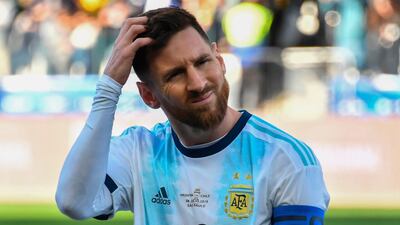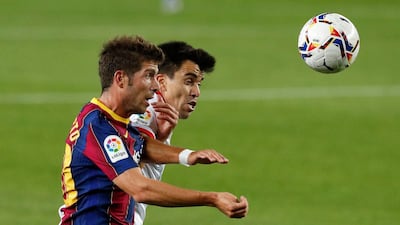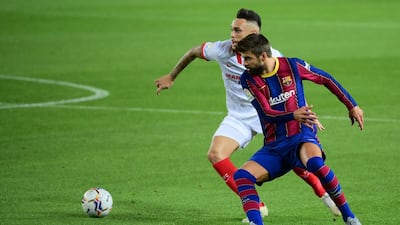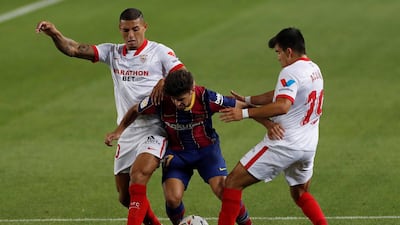After a turbulent summer, Lionel Messi is in need of a lift. As it happens, his compatriots Pablo Dybala, Lucas Ocampos, Marcos Acuna and Guido Rodriguez and his close friend Luis Suarez also needed a lift on Monday, literally. They asked Messi if he could help. It was a long lift, all the way from Barcelona airport to Buenos Aires.
Messi obliged, offering space for the four Argentina players, who are all based at clubs in southern Europe, and Uruguay’s Suarez, on his private jet for a journey of maximum comfort to this week’s first round of 2022 World Cup qualifiers. The plane has 16 passenger seats that convert to eight beds, two bathrooms, complete with showers and two kitchens. The Argentina Football Association have plenty to be grateful to Messi for already; they can now thank him for his role as executive travel agent and chaperone.
Messi, to whom Argentina have for the best part of a decade seemed in desperate debt, is also feeling unusually thankful to his national team. For the last 12 months he has been as frustrated as at any time during his storied, trophy-laden 20 years associated at Barcelona. He asked to leave in August. His vast buyout clause - €700 million ($824m) - prevented him doing so.
Set next to what remains an openly hostile relationship with Barcelona’s president, Josep Maria Bartomeu, and a barren Barca landscape with no fresh trophies and without his close allies, like Suarez (transferred to Atletico Madrid) and Arturo Vidal (to Internazionale) on site, trips to Argentina suddenly look like a happier, less stressful relief.
For most of the past 15 years, it was very clearly the other way around. While Messi blessed Barcelona with his magic and 34 major titles, his senior career with Argentina yielded no major prizes and annual angst. Barcelona soared with Messi; Argentina burdened him. With his club he has won four Champions League finals; with his country he has lost three Copa America finals and a World Cup final. None of his six Ballon d’Ors were earned for triumphs in the blue-and-white stripes of his national team.
In the low times, he has been accused of prioritising Barca over Argentina, for not singing the national anthem before matches. On occasion, the country's greatest ever goalscorer was abused and even spat at by Argentina fans. Four years ago, the relationship severed, Messi announcing his retirement from internationals. Even Fifa were perturbed. He stepped back, much as he had to last month after declaring he intended to leave Barcelona.
_____________________
50 Lionel Messi records
_____________________
His commitment to Argentina now seems absolute, and there is an urgency to fix the striking gap - no senior international trophy - in his resumé. Next summer brings a Copa America that, pending public health concerns, will be partly staged in Argentina. It will be Messi's fifth. Three ended with defeat in penalty shoot-outs. The last one, in 2019, ended with Messi red-carded in the third-place play-off.
Because that was more than a year ago now, his subsequent suspension has been erased, making him available for Thursday, his first competitive match since, and the first step on what will likely be his last stab at a World Cup, the 2022 tournament in the Middle East. He will be 35 by then.
Lionel Scaloni, Argentina’s head coach, has a plan to have Messi as his clear leader but not as overburdened would-be saviour. “It is great to be able to count on Leo,” said Scaloni, “and in the last two matches [friendlies last November], we found a way of making everybody comfortable. We can’t always be expecting him to be the genie with the magic lantern.
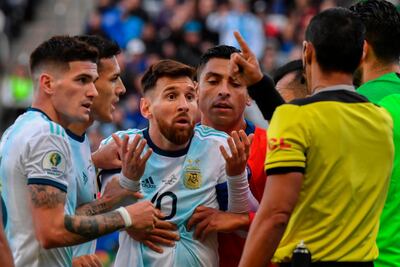
As for his mood, homecomings make Messi smile, says Scaloni. “Whenever he comes to the national team, I see him happy and well. We put whatever is happening at Barcelona aside.”
Against Ecuador, and for next week’s demanding away match in the sapping altitude of La Paz against Bolivia, Messi will be without several long-times allies. Manchester City’s Sergio Aguero is still recuperating from knee surgery and Angel Di Maria, of Paris Saint-Germain, is out of favour with Scaloni, who has named a squad with a glance at the long-term.
Take away the more than 200 caps that Messi and Nicolas Otamendi, who moved this summer from City to Benfica, have between them, and nobody else in Scaloni’s squad has more than 30. As ever with Argentina, though, Messi has a choice of high-class striking partners, in Dybala and Inter’s Lautaro Martinez, with Ocampos also selected after his excellent 2019/20 with Sevilla.
____________________
